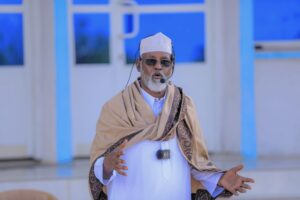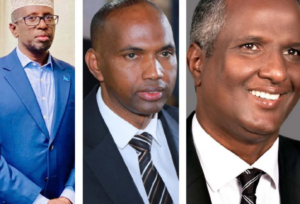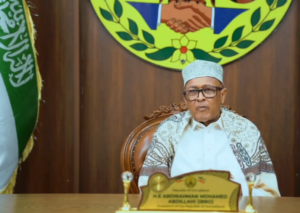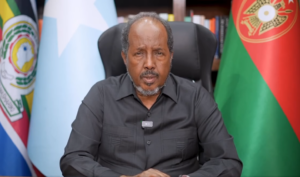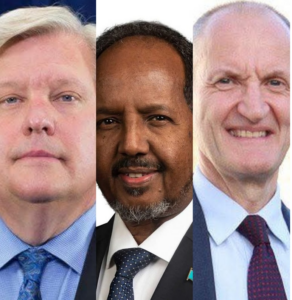WATCH: 60 Minutes: In God’s Name
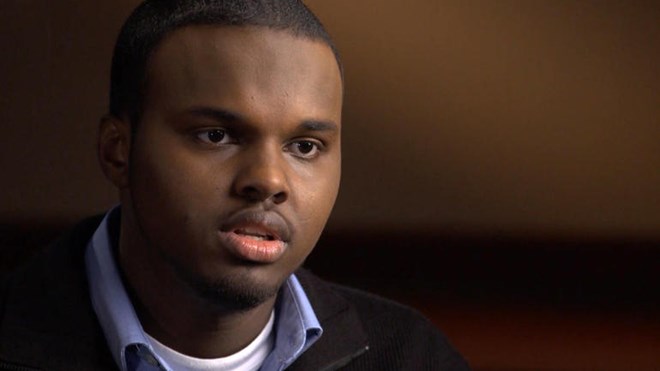

Monday, October 31, 2016
By Scott Pelley
A young American who grew up in the heartland tells Scott Pelley what made him try to join ISIS in Syria
http://www.cbsnews.com/videos/in-gods-name
The following script is from “In God’s Name,” which aired on Oct. 30, 2016. Scott Pelley is the correspondent. Robert Anderson and Patricia Milton, producers.
About 260 Americans have joined, or tried to join, terrorists overseas. And many of us wonder how in God’s name does that happen? How is an American drawn into a group that seeks to destroy everything that America stands for? Abdirizak Warsame has an exotic name but he was an American teenager, living with his mom in Minneapolis, who became the leader of an ISIS cell sending other young men from Minneapolis to their deaths. Warsame will be sentenced soon, he is facing up to 15 years in prison but he was released from jail, for one day, to talk to us, before the judge passes sentence, to explain how he fell for ISIS in God’s name.
Abdirizak Warsame: The reason I wanted to go to Syria was I felt like it was my duty. I felt like it was something that I had to do. And if I didn’t do it, I would be basically a disgrace to God. I would be a disgrace to the world. I would be a disgrace to my family.
Scott Pelley: Did you see the videos of the ISIS atrocities?
Abdirizak Warsame: Yes, I have seen ‘em.
Scott Pelley: Of them shooting people and throwing them into the river one after another? The Jordanian pilot that they burned to death? Did you think you were going to be doing that kind of thing?
Abdirizak Warsame: Yeah. I was going to be, I was going to be participating in those activities.
Scott Pelley: Because those people weren’t true Muslims.
Abdirizak Warsame: Correct.
Scott Pelley: And therefore they deserved to die?
Abdirizak Warsame: Correct.
Abdirizak Warsame learned the theology of murder in Minneapolis, Minnesota. He was an American kid — rising in a tough neighborhood — but never in trouble with the police. He found his way through high school chasing a basketball, pursuing poetry, and music.
[Abdirizak Warsame: “When I say Cedar you say riders. Cedar. Riders. Cedar. Riders.”
“Cedar,” as in Cedar Riverside, was his neighborhood where 20,000 refugees from Somalia began to settle in the 1990s. They set their hearts on the American dream but, like most immigrant communities, the first generation kids grew up between two worlds. Too foreign for many Americans, too American for their parents.
Abdirizak Warsame: I went to school with a lot of kids that were not Somali. And so I kind of got into that culture, you know, music. Going to prom, dancing, it’s hard to kind of explain that stuff to your parents when they kind of really don’t understand what it is.
His mother didn’t understand why he was hanging with tough boys in Cedar, so she prodded him to go to the mosque.
Abdirizak Warsame: Learning about the religion and reciting the Quran, I started to become more religious. I felt like there was something that was missing in me.
The mosque was not extremist. But the lessons were in Somali. And Warsame looked for an English-speaking imam online.
[Anwar al-Awlaki: We are fighting for a noble cause, we are fighting for God.]
He found, Anwar al-Awlaki, born in New Mexico, and a leading spiritual advisor for al Qaeda. Awlaki produced hours of lectures glorifying war on nonbelievers.
Abdirizak Warsame: One of the lectures was titled “Battle of the Hearts and Minds.” And what they do is try to get your heart and your mind and try to get you to join their cause. And so whether you’re doing something good for your community, whether you’re going to school, whether you have a nice job, all of that, they’re gonna make it seem like it’s worthless. And that there is something greater that you can be doing.
Awlaki was killed by a U.S. drone five years ago. But, online, life is everlasting.
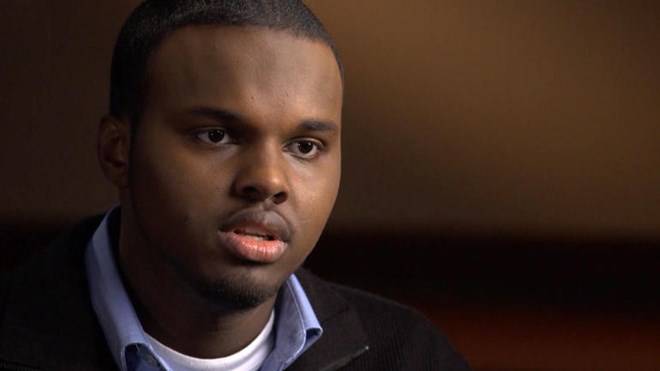
Abdirizak Warsame CBS NEWS
Abdirizak Warsame: He explained how Islam was, you know, like, my calling. It was almost like he was talking to you. And like it made you feel like you were special, you know? And like you’re the chosen one. And the more I listened to it, the more it was appealing to me and the more interesting it became.
Scott Pelley: How much time did you spend watching these videos?
Abdirizak Warsame: I would just continuously watch them when I wasn’t doing anything. When I wasn’t at school or doing my homework or, you know, out with my family. I was watching those videos.
[Anwar al-Awlaki: We are facing you with men who love death just like you love life.]
Around the videos grew a congregation—eleven of Warsame’s friends.
Abdirizak Warsame: I thought I was the only one. But when I met these group of men that I was friends with, it was kind of shocking to see that they also knew about these videos too. We would listen and listen until we became, you know, wrapped in this ideology. All those lectures would talk about how it wasn’t a time for just, you know, talking, but it was a time for action.
The route to ‘action’ was a link away in the recruitment videos of ISIS. Music videos, a language the boys could understand.
Scott Pelley: YouTube became more real to you than your neighborhood in Minnesota?
Abdirizak Warsame: Yes.
Scott Pelley: How could that be?
Abdirizak Warsame: It kind of takes control of you. And you think you’re doing something for a greater cause. And you think you’re doing it for good.
Scott Pelley: And what was that?
Abdirizak Warsame: Most of the videos would talk about how if you would engage in jihad you would be doing your family a favor. And that you would be saving their lives from eternal hell fire.
Scott Pelley:That if you died as a martyr you would not only go to paradise your whole family would go with you?
Abdirizak Warsame: Whole family would go to paradise.
Scott Pelley: And you were trying to be the best Muslim you could be?
Abdirizak Warsame: Correct. You want to be the hero. You want to save everyone. And you want to do good.
In 2014, at the age of 19, Warsame helped organize a plot to join ISIS in Syria. He helped his friends get passports and made connections with people who could smuggle them through Turkey. The first two reached Syria, Yusuf Jama, and Abdi Nur. Nur sent back Facebook pictures.
Abdirizak Warsame: I remember him telling me, you know, “I’m having the time of my life.” And he was fulfilling his dream or on his way to heaven.
Scott Pelley: What happened to him?
Abdirizak Warsame: I believe he’s dead.
Scott Pelley: How did that happen?
Abdirizak Warsame: He was fighting and he was killed.
Yusuf Jama was also killed.
Scott Pelley: Are you responsible for their deaths?
Abdirizak Warsame: Yeah, I believe I am responsible for their deaths and I think about that every day.
Scott Pelley: And if you had been able to get to Syria, what do you think would have happened to you by now?
Abdirizak Warsame: I probably would be dead right now.
Scott Pelley: After your friend, Abdi Nur, left Minneapolis, his mother was trying to find him. She was desperate.
Abdirizak Warsame: She was desperate. She needed answers. And, I knew where he was going. And I did the unthinkable and I lied to her. And I told her that I didn’t know where her son was.
Scott Pelley: She was trying to save his life.
Abdirizak Warsame: Yeah. That was very evil of me to do.
As more of Warsame’s group applied for passports, one of them was evasive about where he was going. And a passport official passed along his suspicions. The FBI got involved and convinced one of the conspirators to cooperate.
Andrew Luger: He ended up wearing a recording device for two months and that’s one of the ways that we have such good insight into the thinking of these co-conspirators.

U.S. Attorney Andrew Luger CBS NEWS
U.S. Attorney Andrew Luger ran the prosecution.
Andrew Luger: There’s a pull and a push. And the pull is this ideology that says, “Se’re building the perfect world. You belong with us. Come join it.” And the push is “They’re not gonna treat you like we will. You’re always gonna be an outsider.”
Scott Pelley: It sounds like a gang recruiting a kid in Chicago?
Andrew Luger: There are a lot of similarities. It goes a little deeper, though, because this message of, “You don’t belong in the West,” is so dangerous.
Luger meets with the community often in hopes of warning parents and turning young men around.
Andrew Luger: Our job, is not only to catch and prosecute criminals, but to prevent criminal activity in the first place.
Mohamed Amin: If there’s violence in society, everyone loses!
Mohamed Amin is among those fighting the ISIS message with one of his own.
Mohamed Amin: We’re comparing their system, al Qaeda, Islamic State. Why is our system better? Because it’s fairer; it’s just; it’s more open and more importantly, it works!
Amin works in a gas station and spends his money producing anti-ISIS cartoons under the name ‘Average Mohamed.’
Cartoon: What do you think your job description is when you join the Islamic State? Behead unarmed innocent people. Destroy world heritage sites, empower unelected, blood-thirsty individuals as leaders.
Mohamed Amin: Given resources and opportunity we can win this fight.
Scott Pelley: Why do you think so?
Mohamed Amin: Because I have hope. Peace supersedes violence. Freedom supersedes hate. And my community wants to be part of the American dream. We love our country. It’s a great country. It’s given us a lot. A lot.
Andrew Luger: We have to work with all Minnesotans to combat Islamophobia, ‘cause racial bigotry and religious bigotry helps the ISIL narrative and we gotta stop it.
Scott Pelley: How does it help?
Andrew Luger: You listen to these young men, and they’re hearing a message that says, “You’re not wanted in the West.” So when a mother is beaten in a restaurant, which happened last year here simply because she was Somali, had a beer mug smashed across her face and told, “Go Home” in front of little kids that helps that ISIL narrative.
Scott Pelley: Was she an American citizen?
Andrew Luger: Yes.
Scott Pelley: And her kids were too?
Andrew Luger: Yes.
Scott Pelley: And so when the person said, “Go home”?
Andrew Luger: The kids said, “What do they mean? We just want to eat at Applebee’s.”
Andrew Luger prosecuted nine of Warsame’s group. Four had been intercepted at JFK airport in New York on their way to Syria. Warsame and five others pled guilty to supporting a terrorist organization.
Abdirizak Warsame: I pled guilty because I knew I was guilty. And I knew what I did was wrong.
Another who pled guilty was Zacharia Abdurahman. His father, Yusuf, told us that his son was working nights to go to college by day. He told us he never saw trouble until he looked in hindsight.

Yusuf Abdurahman CBS NEWS
Yusuf Abdurahman: In our culture the places that I come from we are very harsh. Nomadic society, very harsh. We don’t do compliments, we don’t praise the kids, we don’t hug them. We don’t just tell them, “We love you.” I never tell my kid, “I love you,” until he get caught and he’s behind bars. We are out of touch with our children. I’m not computer savvy. These children, these computers and this Internet this is their toys.
Scott Pelley: Their toys.
Yusuf Abdurahman: Yeah.
Scott Pelley: And you didn’t know what was happening.
Yusuf Abdurahman: We didn’t know what’s happening at the time. You know, I’m a parent that his kid is in jail now. You know, I’m sorry what he’s going through. But, you know, I’m very glad that he’s here. I’m very glad that he was caught, that he was stopped.
Scott Pelley: You’re glad that he was caught?
Yusuf Abdurahman: Yes. Yes. He’s alive.
Of the twelve, two were killed, the one who cooperated with the FBI has not been charged, six pled guilty, and three were convicted at trial. Warsame testified for the prosecution. And these selfies were part of the evidence.
Scott Pelley: Did you write those words?
Abdirizak Warsame: Yeah. It says “Till the death of me, baby.”
Scott Pelley: And what did that mean?
Abdirizak Warsame: That meant to me at the time that this is what I stood for.
Scott Pelley: And you were willing to die for it?
Abdirizak Warsame: For this cause.
Scott Pelley: Hoping to die for it?
Abdirizak Warsame: Yeah.
Scott Pelley: You’re looking at potentially 15 years in prison. Who do you blame for that?
Abdirizak Warsame: Myself. At the end of the day I was the one who made those decisions. I’m trying to do the best that I can to make up for all of the things that I’ve done.
Scott Pelley: Do you really believe that, or are you saying it so the judge will go easy on you?
Abdirizak Warsame: I really believe that. What I’ve done is something that nobody can be proud of. It’s very shameful. I might be very remorseful, but I haven’t done any actions to correct those wrongs.
Scott Pelley: And that’s what this interview is?
Abdirizak Warsame: It’s the only reason I’m doing this interview is to make up for the wrong that I’ve done.
Scott Pelley: And to those young men who are watching those same videos right now today? You say what?
Abdirizak Warsame: I say it’s not worth it. It’s not worth your family going through all the pain and suffering just because you believe in something that is total nonsense. That doesn’t make sense. It’s not worth your life.
Scott Pelley: You watched those videos to change your life. And they have.
Abdirizak Warsame: Correct.
